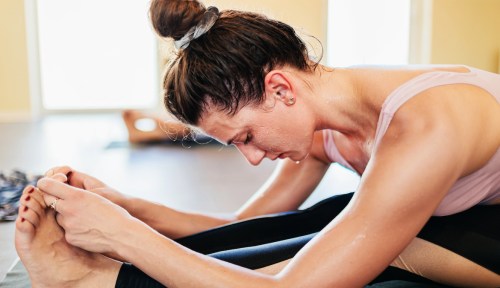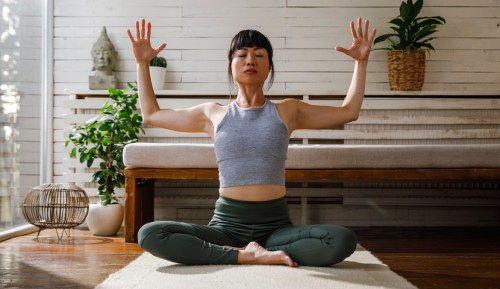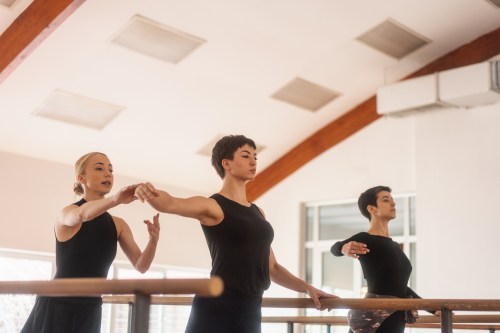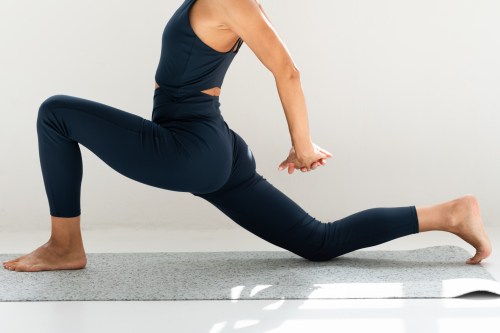There are certain things yogis know their bodies will feel during a particularly intense flow class: stretched for one, strong for another. But… lightheaded? If you’re feeling dizzy from yoga, it could be your body’s way of telling you to chill out for a second.
Experts in This Article
yoga instructor
yoga instructor and founder of Souljourn Yoga
yoga instructor
medical director of Atria New York City, clinical associate professor of medicine at NYU Grossman School of Medicine, and the medical director of New York University’s Women’s Heart Program
licensed psychologist and senior director of national programs at Ellie Mental Health
associate professor of emergency medicine at Harvard Medical School
First things first: What is dizziness?
Feeling woozy, off-balance, lightheaded, or like the world is spinning, are all sensations associated with the feeling of dizziness. There is actually a specific mechanism in your body that’s responsible for making you feel dizzy.
“Dizziness is scientifically caused by the inner ear and fluids in the head—the disturbance of this make us dizzy, which is the feeling that we are moving without actually moving,” explains yoga instructor Kajuan Douglas. The inner ear system is part of the sense of proprioception, or the understanding of where your body is in space. When you lose a firm grip on that, that’s when your dizziness can occur. A number of things, like being on a boat, or even going upside during yoga, could cause that disturbance.
“The inner ear is responsible for our ability to stay balanced and for us to know where we are in the world in a 3D sense,” Niket Sonpal, MD, a New York city-based gastroenterologist and internist, previously told Well+Good about motion sickness. “What happens is that repetitive movements disturb the inner ear, and then it gets tricked into thinking we’re moving a lot. The fluid and what we call the ossicles in the ear start getting thrown off, and then the feedback from that turns into symptoms of dizziness and nausea.”
Blood pressure is another key ingredient in keeping us feeling stable. While pulse is the rate at which your heart pumps and blood flows through your veins, blood pressure refers to the amount of force your blood exerts on your arteries—think of pulse vs. blood pressure as similar to the difference between speed and acceleration. When your blood pressure drops—especially when it drops rapidly—it can disturb the balance of the brain and inner ear fluids, which can lead to dizziness symptoms.
Why am I dizzy from yoga?
Douglas points to five main reasons why you might be feeling a little woozy on your mat: hunger, dehydration, lack of balance, pacing, and visual focus. Depleting your body’s fuel and water, challenging the sense of where you are in space, and changing positions quickly can all work to reduce blood flow to your brain and confound your inner ear.
Hunger and dehydration
Intense movement and sweating can deplete your fuel stores, making things go awry. Dehydration lowers blood flow and oxygen to the brain, which can result in headaches and lightheadedness. “We get these symptoms in young athletic people, and it’s simply because you’re not hydrated enough,” says cardiologist Nieca Goldberg, MD, medical director of the women’s heart program at NYU Langone’s Joan H. Tisch Center for Women’s Health. “And if you’re not hydrated, your blood pressure is low.”
Hunger can also lead to lightheadedness. Doing yoga on an empty stomach can actually have an impact on your brain.
“When you don’t have enough blood sugar, every system in your body goes on reserve to use as little energy as possible, including your brain, making you feel lightheaded or confused,” Shamai Grossman, MD, an associate professor of emergency medicine at Harvard Medical School, tells Harvard Health.
Why heat might exacerbate yoga dizziness
While these issues can happen in any yoga class (or any fitness class, for that matter), the combination of heat, dehydration, and quick transitions in a hot vinyasa flow class could escalate the situation, making you more prone to feeling wobbly.
“When the yoga class is hot yoga, your blood vessels get dilated, and when your blood vessels get dilated, your blood pressure falls,” explains Dr. Goldberg. “So the lightheadedness you’re getting may be due to low blood pressure.”
Yoga poses that could cause vertigo and dizziness
Particular poses, too, may be to blame. The main culprits (to the surprise of exactly no one) are inversions, which can often cause a head rush during yoga.
“An inversion is any pose where the head is below the heart,” says Douglas, noting that you should steer clear of handstands, headstands, and even downward dog if you’re feeling dizzy. If you’re doing poses that challenge your balance, use a “drishti gaze” in which you focus on a stable point out in front of you that “gives you something tangible to focus on while the body adjusts,” Jordan Ashley, founder of Souljourn Yoga, previously told Well+Good about the drishti gaze.
“When you use your vision with intent, it indicates to the rest of the body how the shape should follow,” Ashley says.
Why a fast-paced yoga flow could cause dizziness
Moving from one pose to another too quickly can also cause issues. “Generally, you feel dizzy through the transition into the posture,” says Douglas. “So we have to enter the poses mindfully, which doesn’t necessarily mean slowly. Approach is key.”
The drishti gaze can also help maintain this internal focus.
“With yoga, you think about movement and breath, but when you begin to bring in focus with your eyes, it allows you to connect those two components even more,” Haley Steinhauser, a New York City-based yoga instructor, previously told Well+Good about balance in yoga. “During all of the movement in a yoga class, your mind can easily start drifting and your eyes tend to shift around the room. If you’re able to focus your eyesight, that’s the gateway of bringing your attention inward.”
According to Dr. Goldberg, you may also experience some dizziness when transitioning between lying, seated, and standing poses.
“You might feel most lightheaded when you’re standing, because blood pressure goes down when you’re standing,” Dr. Goldberg says. If you’ve loaded up on H2O before class, you probably won’t notice a difference, but if you’re dehydrated, that’s when problems could set in.
What to do if you get dizzy during or after yoga
The easiest ways to avoid dizziness, Dr. Goldberg says, is to plan ahead by drinking lots of water and having a light snack before stepping on the mat. Make sure you rehydrate after your class as well.
If you do find the room spinning while you’re trying to pretzel yourself into a pose, take a second to chill. Hang out in child’s pose or a meditative seat, and close your eyes, or find a focal point to help balance things out in your brain. “Doing sama vritti which is nicknamed ‘square breathing’ can help calm you down as you find you centering moment,” says Douglas. This is also called box breathing or 4-4-4 breathing.
“To perform square breathing, inhale for a count of four, hold the breath in for a count of four, and continue repeating in this manner,” licensed psychologist Robyn Janssen, PsyD, senior director of national programs at Ellie Mental Health, previously told Well+Good about breathing techniques. You can also lengthen the count of those inhales and exhales for five six, or seven seconds. “This can be done anywhere at any time and doesn’t have to be a part of yoga practice.”
If you’re getting these dizzy feelings frequently or even find yourself fainting after class, it could be a sign of a bigger issue, like low cortisol, an electrolyte imbalance, a dramatically low resting heart rate, or a more serious condition, and you should consult a doctor. Otherwise, hydrate, take it s-l-o-w, and (most importantly) listen to your body. Always.
Sign Up for Our Daily Newsletter
Get all the latest in wellness, trends, food, fitness, beauty, and more delivered right to your inbox.
Got it, you've been added to our email list.











